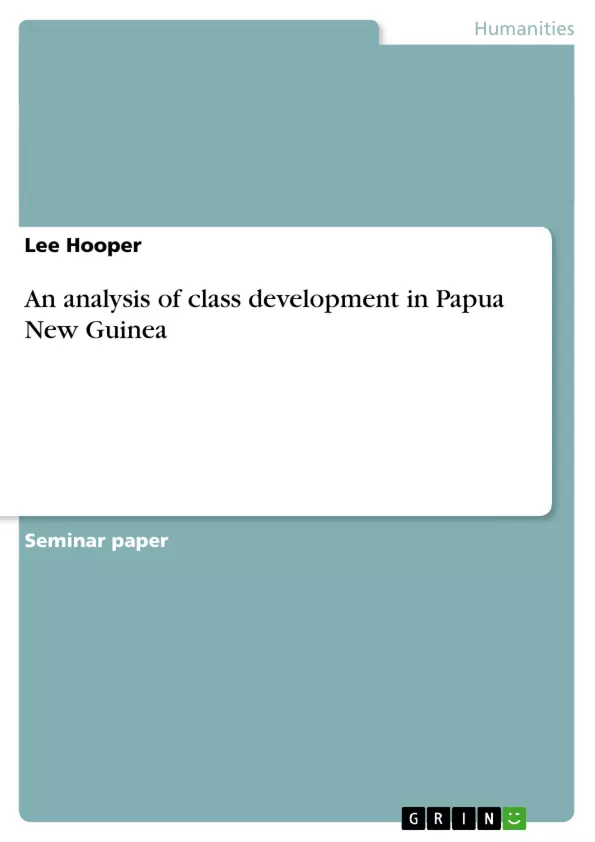This essay will outline the process of class formation within Papua New Guinea (PNG) and show that, although its developments are unique to the region, they are in line with the general capitalist trend of class development. This will be done by outlining a general definition of class in relation to Marxist ideology and then applying this viewpoint to the historical development of PNG in relation to capitalism and class formation. It will show the major influence that the middle class had in the promotion of class identity, particularly normalising class differences. The essay ends with a reflection on middle class values in PNG and how they influence, but are nevertheless, part of the adaptive nature of capitalism. It is concluded that from a Marxist perspective, understanding class formation in PNG is tantamount to understanding class theory in general.
Inhaltsverzeichnis (Table of Contents)
- Class Formation in Papua New Guinea
- Marxist Theory of Class
- Primitive Communism in Papua New Guinea
- Colonialism and Capitalism in Papua New Guinea
- The Development of Class Consciousness in Papua New Guinea
- The Role of the Middle Class in Papua New Guinea
Zielsetzung und Themenschwerpunkte (Objectives and Key Themes)
This essay examines the development of class formation in Papua New Guinea (PNG) and argues that, despite unique regional characteristics, it aligns with the general capitalist trend of class development. It utilizes Marxist theory as a framework to analyze PNG's historical development in relation to capitalism and class formation.
- The influence of Marxist theory on understanding class formation in PNG
- The role of primitive communism in shaping PNG's social and economic structures
- The impact of colonialism and capitalism on class development in PNG
- The emergence of a distinct middle class and its influence on class consciousness in PNG
- The adaptive nature of capitalism and the importance of understanding middle class values in PNG
Zusammenfassung der Kapitel (Chapter Summaries)
The essay begins by introducing the concept of class within Marxist theory, focusing on the proletariat, bourgeois, and petit bourgeois. It then explores the pre-colonial period in PNG, characterized by primitive communism and egalitarian structures. The essay further examines the arrival of colonialism, which introduced capitalism and its effects on PNG's economic and social systems.
It delves into the post-colonial period, highlighting the ongoing influence of colonial legacies and the rise of a middle class in PNG. The essay then explores the development of class consciousness in PNG, emphasizing the role of the middle class in shaping and normalizing class differences.
Finally, the essay reflects on the role of middle class values in PNG, concluding that understanding class formation in PNG requires a nuanced understanding of the specific historical and economic context within which it has evolved.
Schlüsselwörter (Keywords)
The key concepts explored in this essay include: class formation, Papua New Guinea (PNG), Marxism, capitalism, colonialism, primitive communism, egalitarianism, middle class, class consciousness, and historical materialism.
- Quote paper
- Lee Hooper (Author), 2011, An analysis of class development in Papua New Guinea, Munich, GRIN Verlag, https://www.grin.com/document/233132




